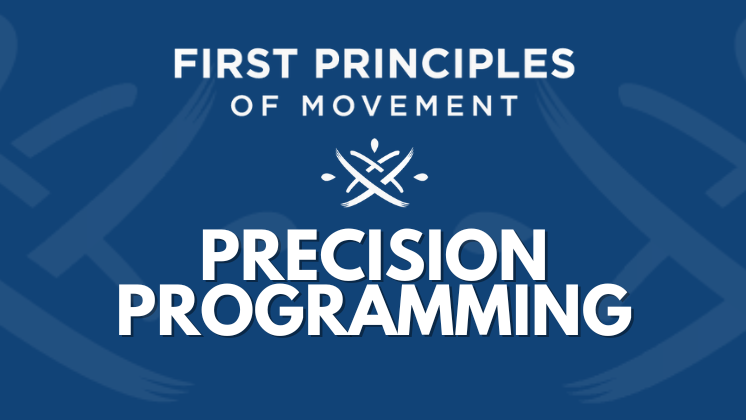First Principles of Movement - Precision Programming
First Principles of Movement - Precision Programming
First Principles of Movement's (FPM’s) mission is to challenge the status quo & promote sustainable athleticism & healthy longevity.
FPM’s vision is to help coaches & clinicians to join a community where everyone is offering an evidence-informed, client-centered approach.
Couldn't load pickup availability
About First Principles of Movement
Over 2000 years ago, Aristotle defined a first principle as "the first basis from which a thing is known." Based upon this concept, first principles thinking boils a process down to the fundamental parts you know are true and builds up from there. First principles thinking is a powerful way to help you break out of herd mentality, think outside the box, and ultimately innovate brand-new solutions to familiar problems.
The FPM Precision Programming concepts & philosophy are evidence-based & practical. They bridge the gap from research to practice to reduce injury risk; accelerate rehab; prevent chronicity; enhance performance in the lifespan of health. This knowledge translation occurs through our unique Lab Immersion Experience with interactive live problem-based active learning presentations and hands-on evaluation and training exercises.
What You Will Learn
- Be able to combine different protocol systems & methods efficiently.
- Be able to connect the dots from the client's story to an actionable program.
- Understand why delaying General Physical Preparation (GPP) creates a slippery slope.
- Be able to find the sweet spot between "too little too late" & "too much too soon."
- Be able to differentiate between Landmarks and Timelines.
- Be able to use a complaint to devise an evaluation that results in a treatment protocol.
- Be more confident and efficient using exercise to improve health and fitness outcomes.
- Deploy Rep Maxes (RMs), Reps in Reserve (RIR), and RPE in exercise programming.
- Develop a Coach's Eye (e.g., Talk Test, eccentric control, loss of concentric power)
- Identifying overprotective client behaviors (excessive guarding, rigid movements, etc.)
- Use internal and external cueing.
- Vary the environment or task to drive gains more efficiently.
- Find the “Hardest thing you do well” nested to the person’s floor - the gap analysis.
- Create a Functional Dashboard to navigate goal attainment.
- Use graded exposures to dispel fear-avoidance beliefs in fragile clients.
- Hide the skill in the drill.
Who This Course Is For
FPM’s vision is to help coaches & clinicians to join a community where everyone is offering an evidence-informed, client-centered approach. This course will greatly benefit the following:
- Chiropractors
- Physiotherapists
- Athletic Therapists
- Athletic Trainers
- Strength & Conditioning Coaches
- Kinesiologists
- Trainers
Curriculum
HOURS 1 - 6
- HOUR 1 - The Inactivity Crisis & Evidence-Discordant Musculoskeletal Health Care Description
- HOUR 2 - Muscle Atrophy and Aging
- HOUR 3 - Muscle Atrophy and Aging
- HOUR 4 - The Movement Prep
- HOUR 5 - Finding What's Tolerable
- HOUR 6 - The Language of Strength
HOURS 7 - 11
- HOUR 7 - How to be More Like Alfred Instead of Batman
- HOUR 8 - The Power of Words & How Labels Can Disable
- HOUR 9 - Acceleration Drills for Sprinting & Sports
- HOUR 10 - Variability: A Key to Risk Mitigation
- HOUR 11 - Profile Template and Gap Analysis with Dr. Ryan Chow
Instructor

Dr Craig Liebenson
DC
Dr. Craig Liebenson, D.C. is the founder of First Principles of Movement, and author of Rehabilitation of the Spine (2007) & The Functional Training Handbook (2014). He provides educational courses for trainers and rehab specialists, in cities around the world.Dr. Craig Liebenson is the first health care provider in California to receive a Certification of Recognition from the National Committee for Quality Assurance (NCQA) on Achievement of Recognition for Delivery of Quality Back Pain Care. He is the founder of First Principles of Movement which is dedicated to promoting health span and preventing disability by addressing the worldwide inactivity crisis.Dr. Liebenson has engaged in research as a Visiting Scholar at Pr. Stuart McGill’s Spine Biomechanics Laboratory at the University of Waterloo, Department of Biomechanics & Kinesiology.Dr. Liebenson is the Founder and Director of L.A. Sports & Spine, providing health span and performance enhancement advice. He supervises one on one, TeleHealth and group Medical Rehabilitation. He began studying directly with both Dr. Karel Lewit and Pr Vladimir Janda beginning in 1987 after launching The Visiting Scholar’s Program at his Alma Mater. He is Continuing Education faculty with Parker University in Dallas Texas and has served on the editorial boards of numerous journals including the Journal of Occupational Rehabilitation; the PM&R Journal of Injury, Function and Rehabilitation; the Journal of Bodywork and Movement Therapy; and Journal of Manual Therapy.Dr Liebenson was the first ever chiropractic member of the McKenzie Institute (U.S.) Board of Directors and is a past Associate Professor at Murdoch University in Perth, Australia.Dr. Liebenson extensively publishes and is the editor of the book/DVD Rehabilitation of the Spine: A Person-Centered Approach (3rd ed), 2020; & The Functional Training Handbook. His books have been published in Spanish, Greek, Korean, Traditional Chinese, Portuguese and Japanese. He also released the DVD series: Functional Integrated Training, Functional Performance Training, Core Stability Training, and Flexibility, Yoga Training and Ergonomic Postural Advice. He worked as the team chiropractor for the N.B.A. Los Angeles Clippers from 2005-2009, served as consultant for the M.L.B. Arizona Diamondbacks, the N.F.L Seattle Seahawks, EXOS (formerlyvAthletes Performance International), Boston Sports Medicine and Performance Group and Perform Better, Inc .



